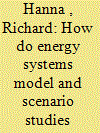|
|
|
Sort Order |
|
|
|
Items / Page
|
|
|
|
|
|
|
| Srl | Item |
| 1 |
ID:
177368


|
|
|
|
|
| Summary/Abstract |
Scenarios may be qualitative or quantitative, the latter of which can be developed using energy systems models. This study explores how different energy systems models and scenarios explicitly represent and assess potential disruptions and discontinuities. The focus is on futures studies and forward-looking scenario and modelling exercises. We apply definitions of ‘emergent’ (uncoordinated) and ‘purposive’ (coordinated) disruption to a systematic review on how energy systems models and scenarios have been used to capture disruption and discontinuity. We first conducted a review of reviews of energy models and scenarios to provide an overview of their common classifications. Additional searches then sought studies which use different types of models and scenarios to explore disruption and discontinuity. We analyse a subset of 30 of these modelling or scenario studies in which authors self-identify and represent disruption or discontinuity, finding that the most frequently used methods were qualitative, exploratory foresight scenarios or agent-based models. We conclude that policy makers could prepare more effectively for social, economic and political disruption by integrating multidisciplinary insights from social and political sciences, engineering and economics through a broader range of methods: exploratory, foresight scenarios, simulation and agent-based models and repurposed energy systems optimisation models.
|
|
|
|
|
|
|
|
|
|
|
|
|
|
|
|
| 2 |
ID:
168331


|
|
|
|
|
| Summary/Abstract |
This paper proposes an approach to comparing and assessing the policy settings in the European low-carbon energy scenarios. First, it presents the methodology including ten characteristics for scenario assessment: modelling framework (diversity), ambitiousness of the targets 2050, relations with other (European) countries, stakeholder involvement, technology options, non-technological aspects, economic component, usage of scenarios in policy design, intermediate indicators of targets' achievement and revision of scenarios. Further, it uses qualitative and quantitative methods to evaluate energy scenarios developed in six north-west European countries (the Netherlands, Germany, France, Denmark, the UK, Belgium). Finally, conclusions are made concerning the possible ways of scenario design improvement. The analysis has shown that all selected countries have potential for modifying their energy scenarios, which being implemented may help to achieve the joint European targets 2050. Since these countries are socially and economically interrelated, a more harmonised approach to scenario development is needed to be designed and introduced on the EU level. Ten characteristics proposed in this study may serve as an initial input for such harmonisation. The results can be of interest to economists, business and academic representatives, and especially policy makers involved in the long-term energy scenario development on the international, regional and national level.
|
|
|
|
|
|
|
|
|
|
|
|
|
|
|
|
| 3 |
ID:
172107


|
|
|
|
|
| Summary/Abstract |
Foresight exercises are increasingly popular among different actors across the globe. Particularly in the context of uncertainties in world affairs, decision-makers are increasingly relying on forward-reasoning to inform their policy. Yet international relations (IR) scholarship is still hesitant to adopt a scenario-based approach. We argue for the use of scenario analysis as a complementary method that is both disciplined and creative. Through scenario analysis, IR scholars simultaneously remain rigorous and provide policy-relevant input that grasps the dynamics of unpredictability of real-world issues. The article discusses the Multiple Scenario Generation method as an unconventional but useful tool, elaborates on its theoretical considerations and concludes with four innovations that scenario analysis can provide for IR scholarship.
|
|
|
|
|
|
|
|
|
|
|
|
|
|
|
|
|
|
|
|
|